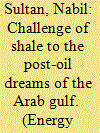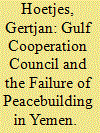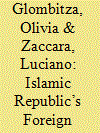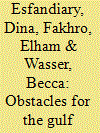|
|
|
Sort Order |
|
|
|
Items / Page
|
|
|
|
|
|
|
| Srl | Item |
| 1 |
ID:
123730


|
|
|
|
|
| Publication |
2013.
|
| Summary/Abstract |
Growth patterns in the Gulf Cooperation Council (GCC) countries suggest that demand for energy in this region is likely to increase in the years to come and this situation ultimately means that more of the region's natural resources will need to be devoted to meeting this demand. For some of the GCC countries, the option to meet future power demands through alternative sources of energy such as nuclear power was deemed an attractive proposition.
Furthermore, real investments and plans to use other alternative energy sources such as solar, wind, hydrogen and geothermal are also gaining momentum in the region. However, relatively recent developments in the technology used for extracting gas and oil from shale rock formations places a big question mark on the GCC countries' energy plans including those relating to alternative and renewable sources of energy.
This article examines the GCC's new energy drive and explores the economic and political motivations behind it. Furthermore, the article also examines the potential impact of shale gas and oil extraction on this region's abundant fossil-based resources and the ramifications of such impact (if it materialises) for the GCC countries' alternative energy plans, future wealth and their political stability.
|
|
|
|
|
|
|
|
|
|
|
|
|
|
|
|
| 2 |
ID:
094934


|
|
|
|
|
| Publication |
2010.
|
| Summary/Abstract |
Bahrain, Kuwait, Oman, Qatar, Saudi Arabia, and the United Arab Emirates are major oil and natural gas producing countries that make up the Gulf Cooperation Council. The six GCC countries fall in the top 25 countries of carbon dioxide emissions per capita and are perceived as the main actors blocking international climate change negotiations. The aim of this article is to discuss from a policy perspective the capacities of the GCC states to switch toward an ecological modernization of their energy sectors. At the beginning of the paper, I analyze the benefits of transforming oil wealth into funding for renewable energy and energy efficiency. After this, I discuss obstacles to such a transformation process based on the rentier states theory. Finally, I investigate governance of the GCC on all levels (international, regional, and local). The article shows that the GCC countries have recently adopted a more pro-active approach toward ecological modernization. This reorientation has not yet resulted in the development of consistent strategies and policies, however. The concluding assumption based on the concept of policy transfer is that pioneering projects such as Masdar City and innovative regulation like the green building code in Dubai will spread within the GCC.
|
|
|
|
|
|
|
|
|
|
|
|
|
|
|
|
| 3 |
ID:
183253


|
|
|
|
|
| Summary/Abstract |
Driven by increasing self-confidence and encouraged by Western states, Gulf Cooperation Council (GCC) states have gained a prominent role in multilateral efforts to foster peacebuilding in Yemen since the country experienced increased conflict from 2004 onwards. Based on the “negative and positive peace framework” proposed by Johan Galtung, it is possible to argue that the lack of focus of the GCC on fostering “positive peace” and disagreements between the Gulf monarchies heightened by hyper-nationalist tendencies inhibit the ability of this sub-regional organisation to facilitate peacebuilding in Yemen.
|
|
|
|
|
|
|
|
|
|
|
|
|
|
|
|
| 4 |
ID:
183245


|
|
|
|
|
| Summary/Abstract |
Despite the often perceived rigidity of its ideology and inflammatory rhetoric, Iran’s foreign policy is inherently pragmatic while nonetheless moving within the institutionalised frame of its revolutionary discourse. An alternative perspective on the Islamic Republic’s and Persian Gulf relations is offered by analysing Iran’s discursive and practical initiatives of constructive engagement with the Gulf Cooperation Council (GCC) countries during Hassan Rouhani’s presidency through the Iranian lens. This includes strategies of discursive persuasion and initiatives such as “World Against Violence and Extremism” (WAVE) as well as the “Hormuz Peace Endeavor” (HOPE), both aimed at building confidence and improving Iran’s legitimacy in the region.
|
|
|
|
|
|
|
|
|
|
|
|
|
|
|
|
| 5 |
ID:
191031


|
|
|
|
|
| Summary/Abstract |
THE unprecedented escalation of the international situation in 2022 along the axis of confrontation between the US (the collective West) and Russia makes the parties to the conflict particularly interested in luring over to their side countries in the Middle East, primarily the Persian Gulf- a region that is very important to the global economy. Amid tough sanctions, stable energy prices are becoming increasingly important to Russia, making its relations with oil-producing countries in the region strategically vital. The effective format of interaction with the Arab states of the Persian Gulf, in particular Saudi Arabia as part of the OPEC+ deal, creates opportunities for mutually beneficial cooperation.
In this situation, the US is adopting a more assertive foreign policy in ensuring security, fostering military-technical cooperation, and leveraging diplomatic tools to change the positions of countries in the region on several sensitive issues for Washington. In recent months, the US has taken a series of diplomatic and symbolic actions: [US] President [Joe] Biden has nominated the next US ambassador to the UAE - Martina Strong, a career diplomat who is very familiar with the region. The US administration has facilitated the implementation of arms contracts valued at $5 billion with Saudi Arabia and the UAE. The US has held several high-level meetings with regional heads of state, exploring the possibility of expanding [US] military infrastructure in Saudi Arabia, with several...
|
|
|
|
|
|
|
|
|
|
|
|
|
|
|
|
| 6 |
ID:
107378


|
|
|
|
|
| Publication |
2011.
|
| Summary/Abstract |
Judging by their official statements, the establishment of a zone free of weapons of mass destruction (WMD) in the Middle East ranks high on the list of policy priorities of the six member states of the Gulf Cooperation Council (GCC)-Bahrain, Kuwait, Oman, Qatar, Saudi Arabia, and the United Arab Emirates (UAE).[1] As countries bordering a once-proliferating, aggressive state (Iraq); facing another suspected of seeking a nuclear weapons capability and bent on regional hegemony (Iran); and living in the vicinity of nuclear powers outside the nuclear Nonproliferation Treaty (NPT) regime (India, Israel, and Pakistan), they arguably have a paramount security interest in its rapid formation.
|
|
|
|
|
|
|
|
|
|
|
|
|
|
|
|
|
|
|
|
|